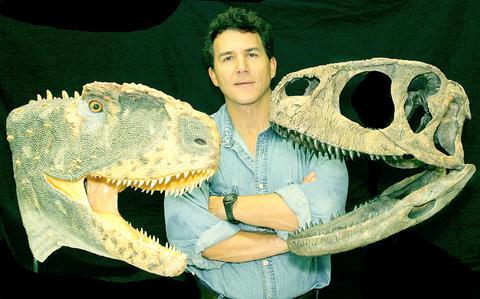The fossil skull of a peculiar, wrinkle-faced dinosaur unearthed four years ago in the Sahara is providing new evidence that Africa split from the other southern continents more recently than previously thought, scientists say.
"It was sort of a missing puzzle piece that serves to banish the notion that Africa was isolated earlier," said Paul Sereno, a University of Chicago paleontologist who led the dinosaur-hunting expedition to a remote, desert region of Niger in 2000.
"It really completes the story very convincingly," he said.

PHOTO: AP
The skull, found amid a wealth of dinosaur bones from the late cretaceous period, came from a dinosaur Sereno named Rugops primus, or "first wrinkle face." The meat-eater, believed to be about 9m long and 95 million years old, belonged to a group of southern dinosaurs called abelisaurids.
Before the discoveries, abelisaurids from that period had been found in South America, Madagascar and India, but none had been confirmed on Africa, supporting a theory that Africa split off first from the southern super-continent of Gondwana 120 million or more years ago.
The new fossil, however, and its close relation to a South American abelisaurid, indicate Africa was still connected to the other southern land masses, at least by land bridge, 100 million years ago, Sereno and his co-authors said.
Sereno and his team were nearing the end of their expedition when they focused on a football-sized area in a remote region of the Sahara. In a span of 10 days, he said, they dug up more dinosaurs of the early part of the Late Cretaceous period than the total of what had been found in Africa before.
"It was like the valley of the kings, except the kings were dinosaurs," Sereno said. He said the team also found previously unknown species of crocodiles and a yet-to-be-named dinosaur that was about 18m long.
"Sometimes you run into the pot of gold. That expedition I think was per pound of discovery the greatest expedition I ever took students on," he said.
Sereno, University of Chicago colleague Jack Conrad and Jeffrey Wilson of the University of Michigan published news of the finding, along with the discovery of another new species of dinosaur, in the edition of Proceedings of the Royal Society of London to be released on Wednesday.
Sereno said Rugops probably was a scavenger that used its long snout to pick at carrion. One odd feature of the dinosaur, he said, was two rows of seven holes along its snout.
"It's the most peculiar thing. We don't know what was growing out of there," Sereno said.
He said it was probably something ornamental, like a fleshy crest.

The collapse of the Swiss Birch glacier serves as a chilling warning of the escalating dangers faced by communities worldwide living under the shadow of fragile ice, particularly in Asia, experts said. Footage of the collapse on Wednesday showed a huge cloud of ice and rubble hurtling down the mountainside into the hamlet of Blatten. Swiss Development Cooperation disaster risk reduction adviser Ali Neumann said that while the role of climate change in the case of Blatten “still needs to be investigated,” the wider impacts were clear on the cryosphere — the part of the world covered by frozen water. “Climate change and

Poland is set to hold a presidential runoff election today between two candidates offering starkly different visions for the country’s future. The winner would succeed Polish President Andrzej Duda, a conservative who is finishing his second and final term. The outcome would determine whether Poland embraces a nationalist populist trajectory or pivots more fully toward liberal, pro-European policies. An exit poll by Ipsos would be released when polls close today at 9pm local time, with a margin of error of plus or minus 2 percentage points. Final results are expected tomorrow. Whoever wins can be expected to either help or hinder the

DENIAL: Musk said that the ‘New York Times was lying their ass off,’ after it reported he used so much drugs that he developed bladder problems Elon Musk on Saturday denied a report that he used ketamine and other drugs extensively last year on the US presidential campaign trail. The New York Times on Friday reported that the billionaire adviser to US President Donald Trump used so much ketamine, a powerful anesthetic, that he developed bladder problems. The newspaper said the world’s richest person also took ecstasy and mushrooms, and traveled with a pill box last year, adding that it was not known whether Musk also took drugs while heading the so-called US Department of Government Efficiency (DOGE) after Trump took power in January. In a

It turns out that looming collision between our Milky Way and Andromeda galaxies might not happen after all. Astronomers on Monday said that the probability of the two spiral galaxies colliding is less than previously thought, with a 50-50 chance within the next 10 billion years. That is essentially a coin flip, but still better odds than previous estimates and farther out in time. “As it stands, proclamations of the impending demise of our galaxy seem greatly exaggerated,” the Finnish-led team wrote in a study appearing in Nature Astronomy. While good news for the Milky Way galaxy, the latest forecast might be moot